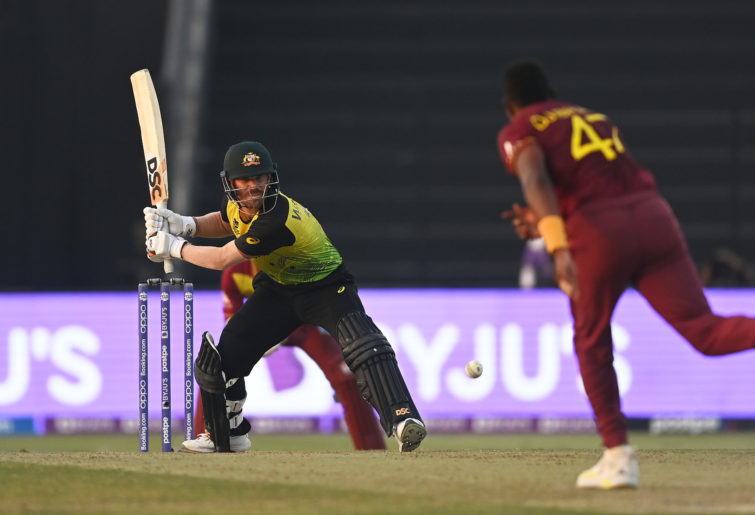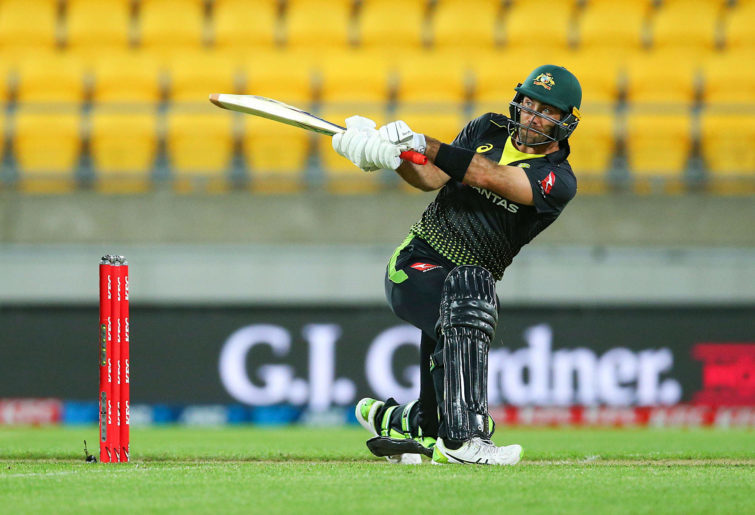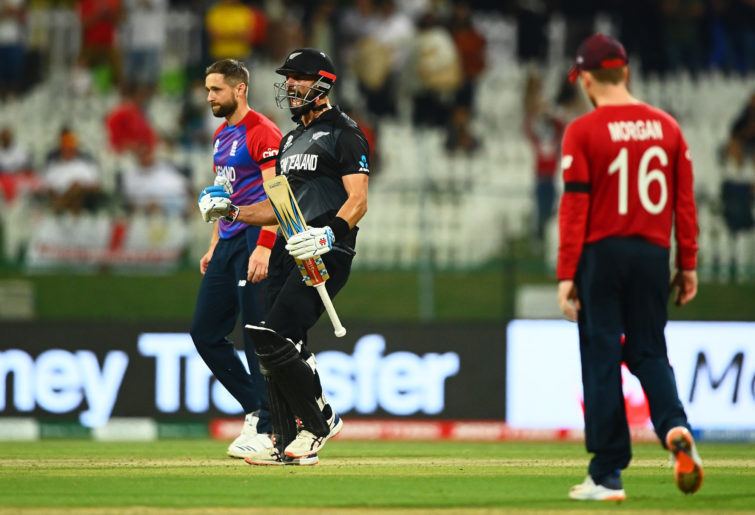Australia finds itself on the brink of the final frontier, with a victory in the T20 World Cup final against New Zealand on Monday morning (AEDT) to secure the only trophy in world cricket yet to be won by the men in green and gold.
But despite going in as favourites, Aaron Finch’s men won’t find it easy against the reigning World Test Champions, with the Black Caps looking to atone for defeats in the finals of the 2015 and 2019 ODI World Cups, and establish themselves as the best team across all formats in the world.
Here are five burning questions ahead of tonight’s blockbuster decider.
In case you missed it: How Australia stunned Pakistan in the semi-final
How on earth did Australia get this far?
Surely not even the most optimistic fan would have thought Australia were anything better than an even-money chance to make it out of the group stage, let alone all the way to the final. Not since the onset of the COVID-19 pandemic have the Aussies so much as won a T20I series; a 4-11 win-loss record in 2021 heading into the World Cup had the Aussies sitting sixth in the world T20 rankings. The only long-term Test nations behind? The West Indies and Bangladesh, who had just dished out 4-1 series defeats to an admittedly second-string Australia.
So what has gone right? For starters, the bowling has been boosted by star quicks Mitchell Starc and Pat Cummins playing their first T20Is in over a year. After five and a half years of trial and error with the front-line attack, which has seen no fewer than seven different seamers handed debuts (Jack Wildermuth, anyone?), the selectors made things simple, and picked who most experts believe as the three best fast bowlers in the country. With Josh Hazlewood also playing every match for the tournament to continue his year of white-ball resurgence, Adam Zampa for Nathan Lyon is the only change from the foursome expected to line up for the first Ashes Test.
Perhaps more impactful has been David Warner, who had appeared in just two T20Is since Australia sat atop the world rankings back in early 2020. Derided as over the hill following his turbulent falling-out with IPL side Sunrisers Hyderabad this year, who stripped him of the captaincy before dropping him from the side, many thought the opener was the weakest link in an already flaky batting line-up.

(Photo by Gareth Copley-ICC/ICC via Getty Images)
Instead, Warner has shown why he’s still one of the world’s most destructive batsmen, half-centuries against Sri Lanka and the West Indies helping the Aussies ace tricky run-chases and – crucially – boost their net run rate, before his pièce de résistance against Pakistan. A phenomenal 30-ball 49 against some difficult bowling was just as match-winning as Marcus Stoinis and Matthew Wade’s more celebrated heroics at the death.
No doubt removing him early, as England did during Australia’s one defeat of the tournament, will be front of mind for the Black Caps’ bowlers.
Will it be win the toss, win the match… again?
Perhaps no World Cup in history has had more riding on the coin toss. Throughout the tournament, the template for victory has been simple: win the toss, bowl first, and get a massive edge in the run-chase as evening dew sets in.
Nowhere has it been more crucial than in Dubai, where 11 of 12 games so far have been won by the team batting second, including Australia’s semi-final stunner against Pakistan. The only exception? The Black Caps themselves, though their 16-run group stage victory over Scotland carries with it several caveats, from the mid-afternoon start time largely removing the night dew from the equation to the lowly status of the Associate nation.
Captain Aaron Finch notably took time to downplay the importance of the toss during the build-up to the final. “At some point, to win this tournament you’re going to have to win batting first,” he said.
“I was actually hoping to lose the toss [against Pakistan] because I would have loved to put a score on the board in that semi-final… if you can put a total on the board and make the opposition take risks early in their innings, then that’s what it’s all about.”
However, Finch was similarly ambivalent leading into the semi-final, where he couldn’t have decided on bowling first any quicker after calling correctly. For all the skipper has said publicly, no doubt whoever wins the toss on Monday morning will be backing the dew to give them a vital edge.
Is Glenn Maxwell’s T20 legacy on the line?
Heading into the tournament off the back of a destructive IPL stint, Australia’s one hope for a successful World Cup, it seemed, was dependent on Glenn Maxwell.
Remarkably, though, the Aussies’ run to the final hasn’t been because of the Victorian; it’s been in spite of him. Clearly the worst of the seven main batters used during the campaign, Maxwell’s World Cup so far makes for ugly reading. Just 36 runs at an average of 9, with a strike rate of 78.26 that would make Chris Rogers blush, is nothing short of disastrous from one of the most dynamic ball-strikers in world cricket.
To his credit, the ‘Big Show’ has been excellent as Australia’s first-choice fifth bowling option, conceding just 6.54 runs an over with a penchant to enable Finch to safely forego Ashton Agar for the extra batting depth of Mitchell Marsh. But Maxwell’s batting is the reason he is in the side, and is why no player on either side has more riding on a return to form in the decider.

(Photo by Hagen Hopkins/Getty Images)
Despite his nickname, recent World Cups haven’t been kind to Maxwell. He averaged a below-expectations 27.25, with a top score of just 31, in Australia’s ill-fated 2016 T20 campaign; then, in 2019, he and Stoinis were the two major scapegoats for a semi-final wipeout against England in the ODI scene. He’d average 22.12 that tournament, albeit with a strike rate of 150, but his inability to rescue the team against the Poms has made him no longer a regular presence in the 50-over team.
“He’s such a talented player,” Fox Cricket’s Mark Waugh opined leading into the win over Pakistan; “but for the talent he’s got, he should probably win more games for Australia than he does.
“As Steve Smith said, for Australia to go well in this tournament, a lot of it is going to hinge on the back of Maxwell. So far he hasn’t got it quite right.”
For good or bad, Maxwell’s legacy, at least in the court of public opinion, might be on the line. A match-winning display, and all his struggles will be redeemed and then some. Another Big Show no-show, and the wolves will be at the door for one of Australia’s biggest white-ball stars.
WATCH: The bizarre way Black Caps star ruled himself out of T20 World Cup final
Did Pat Cummins show how to master the Dubai deck?
Australia’s fast bowlers took a battering at the death against Pakistan in the semi-final, with first Mohammad Rizwan, and then Fakhar Zaman, clearing the fences at will. Then, it was Australia’s turn to do the same, Wade’s clubbing of three sixes off Pakistan’s brightest star Shaheen Shah Afridi in the second-last over the ultimate exclamation mark on a game-wide trend.
All up, Australia’s four quicks – including one over from Mitchell Marsh – conceded 128 runs from 13 overs; Pakistan’s did no better, giving up 111 from 11. Ugly reading… with the exception of one over from Pat Cummins late in the piece.
Bowling the 19th over for Australia with Pakistan swinging for the fences, Cummins, whose figures read 3-0-28-0 leading into the over, changed tack. Bowling slower ball after slower ball, and repeatedly hitting back-of-a-length areas, he frustrated the life out of the batters. A 112kph ball mistimed to long-on by star finisher Asif Ali started the run; by the end of it, Cummins had had another catch dropped, conceded just two runs off the bat and one additional leg-bye, and hit Fakhar on the helmet with the over’s only delivery even approaching full pace.
In contrast, Mitchell Starc opted to go for his trademark yorkers in the final over, only to watch Fakhar hit consecutive sixes to push Pakistan’s total above 170. Then, for Pakistan themselves, Afridi went full pace in the final over, and we all know what Wade did next.
No doubt the Black Caps will have taken notice of Cummins’ slower-ball success, and one can only imagine his fellow Aussie quicks will do likewise. The likes of Tim Southee and Trent Boult, wily veterans who know their craft like the back of their hands, should be able to replicate it; but third seamer Adam Milne, whose lightning pace has made him a perfect enforcer for this New Zealand bowling outfit, might find the challenge a tricky one.
Who is the Kiwi the Aussies must attack at all costs?
Former Indian star Irfan Pathan described New Zealand’s T20I team in a similar way to how they’ve been seen in every other format over the last decade:
While it’s true that Kane Williamson’s otherworldly qualities diminish the shorter the format gets, Pathan does this Black Caps team a disservice. Yes, they are a consummate team that plays more than the sum of its parts… but they have enough X-factor to match any team in the world, and that is precisely why they have made it to the final.
Boult has claimed 11 wickets for the tournament, almost two a match, while going at a tick over 6.5 runs per over. For any other team, Daryl Mitchell’s remarkable tournament as a makeshift opener would have been heralded as the birth of a star. Then there’s Jimmy Neesham, who whacked sixes for fun to snatch victory from a shellshocked England in the semi-final. ‘Solid team players’? There’s nothing merely solid about any of them.

Daryl Mitchell of New Zealand celebrates after defeating England at the T20 World Cup. (Photo by Alex Davidson/Getty Images)
One man that does fit Pathan’s criteria perfectly, however, is spinner Mitchell Santner. The control his finger-spin offers in the middle overs is a major asset for Kane Williamson, and allows him to effectively use his best bowlers, Boult and Southee. Only Afghanistan have really taken Santner down this tournament; despite a bowling average of 63, he has conceded just 6.63 runs per over.
Spin proved decisive in Australia’s semi-final against Pakistan, with the two best bowlers on the night leggies Adam Zampa and Shadab Khan. If the Kiwi quicks cop some punishment, they’ll look to Santner, even more than the attacking but occasionally expensive Ish Sodhi, to peg things back.
Interestingly, Santner only bowled a single over against England, with Williamson unwilling to use the left-hander against fellow southpaws Dawid Malan and Moeen Ali. With Warner the only leftie in Australia’s top six – unless Wade is given a promotion – Santner will surely take centre stage more often.
That’s where Warner comes in. An underrated part of the semi-final win was Warner’s savage assault on Pakistan’s Imad Wasim, who performs a nearly identical role to Santner. Heading into the match, Wasim had conceded just 89 runs in 16 overs for the tournament, opening the bowling and frustrating even the great Virat Kohli. He was no match for Warner, though, who took advantage of the match-up with a six and two fours to take 17 off Wasim’s second over. By the time he was brought back on, right-handers Maxwell and Stoinis were at the crease. The result? Just three runs.
The onus will be on Warner to do the same to Santner, should he be at the crease when Williamson throws his spinner the ball. If he’s already been dismissed, then Australia must be proactive if possible and promote Wade to take on the job. It didn’t prove costly against Pakistan, but a tight spell from Santner, on a pitch expected to yet again favour the batters, could prove the difference between a maiden T20 World Cup title, or taking the plane home empty-handed.































































































